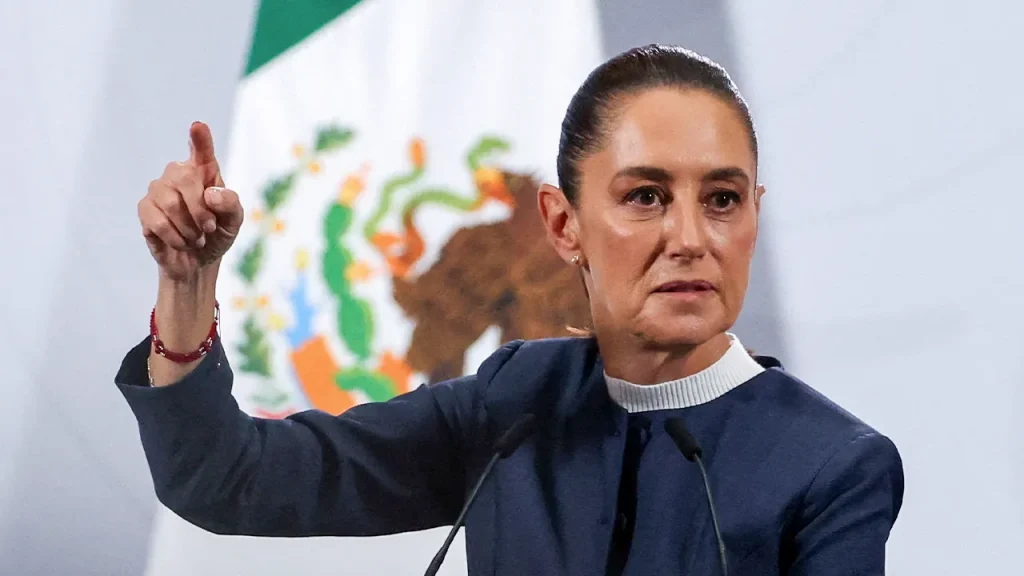Mexican President Sheinbaum Stands Strong After Public Harassment Incident
In a disturbing incident that has sparked national conversation about women’s safety in Mexico, President Claudia Sheinbaum experienced firsthand the kind of harassment that countless women face daily. While on a short walk between Mexico’s National Palace and the Education Ministry in Mexico City on Tuesday, Sheinbaum was approached from behind by an intoxicated man who groped her and attempted to kiss her. The moment, captured on video that quickly went viral, shows Sheinbaum maintaining remarkable composure—gently pushing the man’s hands away while keeping a stiff smile. Her security detail promptly intervened, separating the president from the harasser as stunned onlookers watched the scene unfold. Following the incident, Mexico City Mayor Clara Brugada announced that the man had been arrested, marking a swift response to an act that violated not just the president’s personal space but represented a broader social issue facing Mexican women.
Rather than downplaying the incident, President Sheinbaum, who made history as Mexico’s first female president when she took office in October 2024, decided to use this troubling moment as a catalyst for change. Taking to social media platform X, she announced her intention to press charges against the man and, more significantly, to “review the legislation so that this crime is punishable in all 32 [Mexican] states.” Her powerful message continued with a poignant question that resonated with many: “If this can happen to the president, what can we expect for all the young women in our country?” This stance reflects Sheinbaum’s commitment to addressing gender-based harassment not merely as a personal affront but as a systemic issue requiring legal and cultural intervention. The 62-year-old president, previously the head of government of Mexico City until 2023, has shown through this response that her leadership extends to championing women’s dignity and safety throughout the nation.
During her daily news conference on Wednesday, President Sheinbaum framed the incident within the broader context of women’s experiences in Mexico. “This is something I experienced as a woman, but it is something that all women in our country experience,” she stated, elevating the conversation beyond her individual experience to address the collective struggles of Mexican women. While acknowledging the violation she endured, she also criticized the circulation of the video as “completely unethical and immoral,” highlighting the complex dynamics that often surround the documentation and sharing of such incidents. Her measured response demonstrates a nuanced understanding of how harassment issues intersect with privacy concerns, even as she uses her platform to advocate for widespread change.
In a decisive move that transforms personal violation into public policy, Sheinbaum announced plans to launch an educational campaign specifically targeting men’s understanding of women’s rights. “This is an issue of dignity for women and of recognizing our rights,” she explained, connecting this initiative to a women’s rights booklet her administration has already published. This approach recognizes that combating harassment requires not just punitive measures but also preventative education that reshapes cultural attitudes toward women’s bodily autonomy. By framing her response in terms of “defending all Mexican women,” Sheinbaum positions herself not just as a victim seeking justice but as a leader leveraging her experience to create broader social change, a stance that resonates with her historic role as Mexico’s first female president.
Perhaps most remarkably, President Sheinbaum has refused to let this incident alter her approach to governance and public engagement. “We cannot distance ourselves from the people,” she asserted firmly. “That would be to deny where we come from and who we are.” This commitment to accessibility, even in the face of personal vulnerability, speaks to Sheinbaum’s leadership philosophy that values connection with citizens over personal comfort or security. It also stands in contrast to the often-distant stance many political leaders adopt, particularly after experiencing threats or violations. By maintaining her commitment to public engagement while simultaneously addressing the harassment she faced, Sheinbaum models a form of leadership that balances personal dignity with public responsibility.
The incident involving President Sheinbaum illuminates the persistent challenges women face in public spaces, regardless of their power or position. When even a nation’s highest-ranking official can be subjected to unwanted touching and advances during a routine public appearance, it underscores how deeply ingrained such behaviors remain in society. Yet Sheinbaum’s response—combining legal action, legislative review, educational initiatives, and continued public engagement—offers a template for how women in positions of authority can transform personal violation into meaningful reform. As Mexico grapples with this high-profile case of harassment, the nation has an opportunity to reconsider how it protects all women’s dignity and safety, not just those in positions of power. Through her words and actions, President Sheinbaum has transformed a moment of personal vulnerability into a powerful call for national reflection and reform, demonstrating that true leadership often emerges most clearly in moments of adversity.


